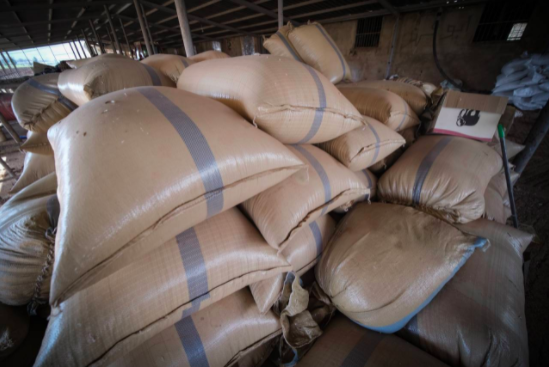
Bags of wheat on a farm in the Bekaa Valley. (Credit: João Sousa/L’Orient Today)
BEIRUT – The Russia-Ukraine crisis pits Lebanon’s top two foreign sources of wheat against each other, but it remains to be seen what impact, if any, the crisis will have on Lebanon’s supply of the crucial foodstuff.
The May wheat futures contract, trading in Chicago, closed up 6.03 percent on Tuesday, as the geopolitical crisis continued.
Ahmad Hoteit, president of the Association of Mills in Lebanon, told L’Orient Today the largest factor impacting wheat prices at the moment remains global fuel prices. “But maybe if things escalated in Ukraine, there could be a bigger problem in the whole Black Sea, which would force us to go for other options,” he said.
Reuters predicts “any interruption to the flow of grain out of the Black Sea region is likely to have a major impact on [global] prices and further fuel food inflation.”
Between 2010 and 2018, Lebanon imported between 66.99 and 95.10 percent of its foreign wheat from countries in the Black Sea region, according to a 2019 study conducted by British international development company Crown Agents. The vast majority of Lebanon’s wheat needs are met by imports rather than domestic production.
Four major wheat exporters, Ukraine, Russia, Kazakhstan and Romania ship grain from Black Sea ports.
Of the eight years running from 2010 to 2017 Russia was Lebanon’s largest wheat supplier in six of them, and the second-largest supplier for the other two years, according to UN Comtrade data. Ukraine was Lebanon’s largest wheat supplier in two of the years, and the second-largest supplier in five more. Together, the two countries virtually monopolized the top-two slots in Lebanon’s list of wheat suppliers, except for in 2013, when another Black Sea exporter, Romania, snagged second place.
“If the whole Black Sea were to be impacted by war,” predicts Hoteit, “there would be some impact because the other option is to import from America or Argentina, which takes 25 days because of the distance, so there could possibly be a shortage in Lebanon. But if we took wheat from other Black Sea ports besides Ukraine, in my opinion the only impact will be on price, and not on the supply of wheat.”
UPDATE: As originally published, this article said that Chicago wheat futures jumped over 2 percent on Tuesday. It has been updated to reflect the exact percentage by which the May wheat futures contract increased on Tuesday.